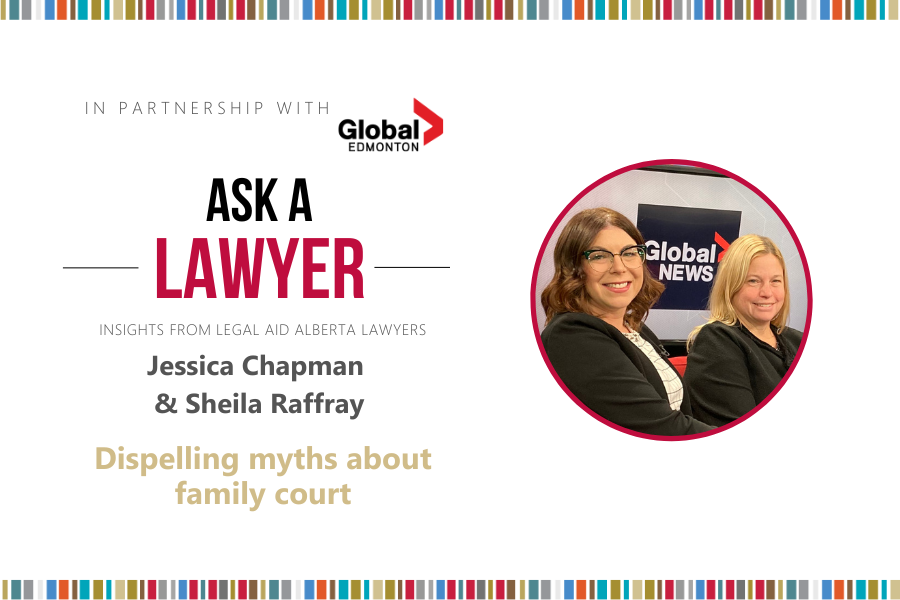Legal Aid Alberta staff lawyers Sheila Raffray and Jessica Chapman join Global News to clear up commonly held beliefs about how family courts work.
The justice system is complicated. For people representing themselves in family court, misconceptions can lead to unrealistic expectations, compounding their challenges and leading to delays and frustrations.
Legal Aid Alberta staff lawyers Sheila Raffray and Jessica Chapman spoke with Ciara Yaschuk on Global Morning News Edmonton to clear up commonly held beliefs about how family courts work.
Please view the video with Microsoft Edge web browser.
Transcript of the program:
Ciara Yaschuk: Going to court for any reason is often stressful, especially if you haven’t contacted a lawyer for help. All too often, people come into the justice system often with misconceptions about how court works, leading to delays and frustration.
Here to clear up any misconceptions that people may bring into family court are Legal Aid Alberta staff lawyers Jessica Chapman and Sheila Raffray. Thank you for joining us.
Sheila Raffray and Jessica Chapman: Thank you.
Ciara: Both of you practice family law. What are some common misconceptions you’ve seen when people show up in court?
Jessica: Well, even before they show up I often have people coming and saying, I want full custody. That’s not really a legal concept in Alberta law. The courts are making decisions about parenting based on time, on who’s going to make what decisions for the child.
Sheila: And so I think related to that, a lot of parents will come to us and say, “What are my rights as a parent?” The court’s concern, and the main focus, is “What are the rights of the child?” The court, when they’re making any decision about parenting, is going to be looking at the best interest of the child, and not the rights of the parent.
Ciara: Fair enough. And parenting is an emotional topic for many. So what misconceptions do people have around that?
Jessica: Well, some people seem to think that parenting and child support can be very related and dependent on each other. And so people will think that they can give up their parenting rights and walk away from paying any type of support. The other thing that people think is that just because they are paying some amount of support they’re entitled to a certain amount of time and that’s simply not how things work. The courts treat those as separate issues.
Sheila: Another misconception is that if a child or young person is 12 or 13 years old, suddenly they get to decide which parent they are going to live with. And that just isn’t the case, that isn’t the law. There isn’t a magical age where a child gets to decide which parent to live with.
Ciara: Yes, so every case is different, obviously. What about child and partner support? This seems to be a pretty disputed issue.
Jessica: So, there are set guidelines for child support, and it’s based on the province you live in and the income that you have. Figuring out those things, what your income is, is usually the main issue there and there is a series of charts. And for spousal support there are also guidelines to assist but aren’t mandated into law.
Sheila: And there are some misconceptions or beliefs that just because you or your ex-partner or spouse enter into a new relationship or have another child that you don’t have to pay child support anymore, or that you don’t have to pay spousal support. But it’s much more complicated than that. And just because a child turns 18 doesn’t automatically mean that child support isn’t owed anymore.
Ciara: Fair enough. So what is the impact on the courts when people who, for one reason or the other, maybe want to represent themselves?
Sheila: Yeah, one of the biggest challenges right now is that if you’re representing yourself, it’s a complicated system. Something that takes – that a lawyer can do in one or two appearances, is going to take maybe an unrepresented person three to four, to five appearances before the judge. It can contribute to further backlogs within the courts. Fortunately, something Legal Aid Alberta does provide is duty counsel services at various communities across the province, where a lawyer is available to provide assistance for that appearance.
Jessica: The courts have also brought in a series of requirements, and they are starting to enforce this as of December 18th. And so now people, including lawyers, have to make sure before they can bring forward a family court application, they have to make sure they have their financial disclosure filed, they have to have their parenting after separation certificate concluded, and they have to have tried some sort of alternative dispute resolution process. That could be mediation, for example. And for self-represented people, they must meet with a family court counsellor before they can file an application. Family court counsellors aren’t lawyers, but they are extremely helpful and sort of keep the court system moving.
Ciara: So sort of doing that legwork before, it would obviously make your job easier as well and maybe speed up the process in court.
Jessica: Exactly. The hope is it will make everything more efficient overall.
Ciara: Thank you so much for all of this information.


